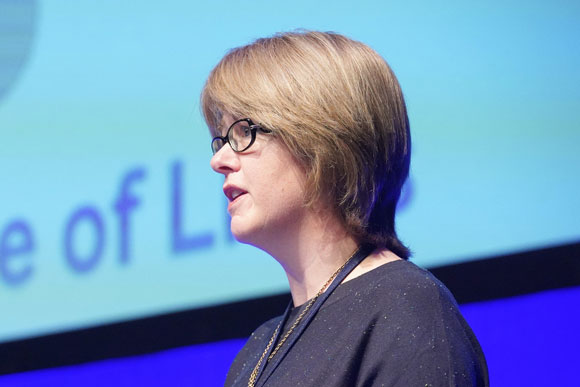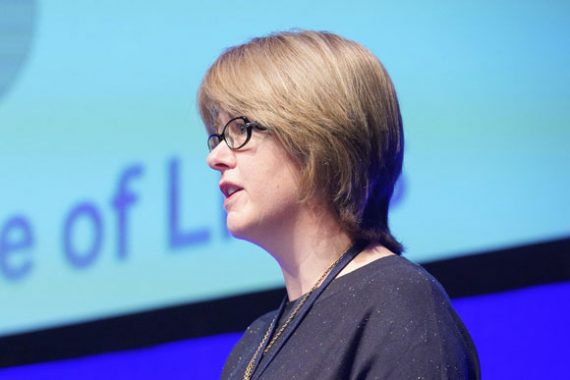
Dr Lucy Henshall gave a moving speech at the LMCs Conference in Belfast this year about the suicide of a friend. She says GPs need to start prioritising their own wellbeing
Speaking about the suicide of our dear friend, my husband’s ex-GP practice partner Rich Bennett was an easy decision. I knew real stories would be the best way to convey meaning to the audience – and to have lasting impact.
Figures are forgettable, stories travel.
Suicide in doctors is an unsavoury reality that is still largely unseen, and generally talked about in hushed voices behind closed doors. Almost embarrassment to the NHS, which perhaps does not want to admit the reality of the shocking ONS statistics.
Headlines about individual GP suicides rarely last more than a few days. Few, if any, articles in mainstream newspapers highlight ‘yet another suicide of an NHS GP’.
Maybe that is just what is needed now – mainstream press attention – to unmask the tragic reality that we continue lose some of our very best doctors by suicide, because the toxic system in which they do their extraordinary work, and to which they have dedicated their lives, has failed them as human beings.
This is a scandal.
Sarah Westerbeek of Kent LMC agreed when she spoke up in favour of the motion:
‘Make no mistake, this is a crisis’, she said. ‘An increased risk of suicide is an entirely unacceptable occupational hazard, and we must act now.’
My speech highlighted the serious and pressing matter of the longstanding and wholly inadequate provision of psychological support for GPs.
Instead of protected time, space and opportunity to process the emotional burden of caring, and embedded coaching and mentoring within our career structures as a given, we are expected to self-manage and largely ‘just cope’ with all that is thrown at us, week in week out, over decades. Possibly with the addition of a one-off mindfulness course, or occasional CPD activity that touches on wellbeing and self-care for an hour or so. Shameful. But true.
Our work, our vocation is demanding of our energies, emotions and intellect in equal measure. But too little attention has been paid to that emotional and psychological wellbeing agenda.
Entry to medicine has become so competitive that only those who have excelled in all spheres of their young lives actually make it through the gate. Imperfections, normal human variability is no longer tolerated. Excellence is expected across the board. Always.
For many in medicine, the first experience of ‘failing’ is a devastating experience, compounded by the attendant criticism and pressure to ‘do better’.
This fact, in combination with commonly occurring personality traits in medics, such as perfectionism, altruism and the keen attention to detail, can too easily lead on to those individuals becoming martyrs, obsessively workaholic, and unnecessarily self-critical and disheartened if they stumble or struggle – just when they most need support, reassurance and encouragement. Or permission to be imperfect, tired or unwell.
Once in practice, the expectations on GPs of uncomplainingly sustaining the perennially excessive and often unsafe workloads, simply compounds the growing sense of isolation and despair for anyone who struggles to stay afloat.
Those with a need for adjustments to their work pattern for personal health or disability-related reasons, or temporary flexibility due to ill health or burdensome co-existing life challenges, can find it very difficult, and at times impossible, to cut themselves some slack. Because everywhere is so pressured, understaffed and under-resourced.
GPs expect each other to ‘keep going’ in ways that they would never expect of their registered patients. Harsh, but true.
Sometimes GPs unknowingly judge each other as ‘lesser’ for doing less work. Even if the quality of that work is absolutely equal, and payment is made pro rata.
Phrases used in good faith, such as ‘only’ being part-time, or ‘just a locum’ are inherently judgmental – even if judgment or criticism is unintended. GP locum work can be the loneliest and most difficult space of all in which to practice clinical medicine.
GPs expect each other to ‘keep going’ in ways that they would never expect of their patients
Receiving these critical comments and recurring experiences can be psychologically damaging.
Add in to the mix the overtly unpleasant bullying and discriminatory behaviours of some organisations and individuals, the wholly unrealistic expectations of society, ridiculous workload and imposed must-dos within our daily work… the combination becomes a very potent recipe for GP emotional breakdown.
Even if home life is fine. Add in some personal, life or family challenges…
Breakdown is often triggered by a relatively small event, but one last straw that literally breaks the camel’s back. A tense encounter with a patient or colleague; illness in a family member; a complaint, even if not a serious one, can hit an already vulnerable GP very hard.
In reality, most GPs are sailing close to the wind most of the time. Burnout awaiting, anxiety and depression knocking at the door.
What is needed now is the deliberate and very visible resetting of the balance to enable ALL GPs to first apply their own oxygen masks, before turning to care for others, ie) their patients.
Reinstatement of designated time for meaningful peer support and debrief within the workplace, whether in a 15-minute face to face coffee break with all GPs together on a daily basis (with no interruptions) or a weekly meeting with no business agenda beyond time to check in with each other, or an external Balint or facilitated peer support group on a less frequent basis.
Humans are pack animals. We thrive in groups, not in isolation. We need that sense of belonging to a pack, a tribe. Meaningful peer support can improve and sustain emotional wellbeing and can provide a safe space in which to share dilemmas, uncertainties, frailties and fears – without fear of criticism.
As a profession, I believe we should now be speaking up for our rightful professional and personal needs, and demanding the right to close our practice doors for such activities to take place within routine working hours.
Patient activity can and should be suspended to accommodate this small-time contribution towards maintain a healthy GP clinical workforce over time.
Locking the door and switching off phones for perhaps one hour per week is not much to ask. Appropriate access to emergency cover is entirely possible to create across the landscape, using technology where necessary to support.
A small investment centrally, with the potential for huge return if the GP clinicians then remain well, fit and at work. Instead of taking long term sick leave, early retirement, or the ultimate exit route, suicide.
Loneliness is an increasingly reported phenomenon amongst GPs across the country, who can sit for 10-12 hours a day in a room in front of a computer, alone for hours at a time, and who spend little or no time in the same physical space with their colleagues. The Government has already appointed a loneliness minister. Perhaps we should talk to her.
My speech clearly resonated with those present in the Waterfront Hall in Belfast, who rose to their feet as one, and then paid their respects to our many peers lost through suicide, with a powerful one-minute standing silence, after the debate was finished.
The speech and subject matter have also resonated with peers and professionals far beyond.
Personal feedback and conversations both at the conference and over the following days was extraordinarily moving. GPs sharing with me many stories of lost peers, personal struggles and thankfully several rescued situations thanks to timely actions of emotionally intelligent GPs who had seen colleagues in distress.
Since the LMC Conference, I’ve continued to receive written and verbal encouragement to continue my own speaking up, lobbying and campaigning, from senior individuals in GPC, BMA and RCGP, as well as occupational health consultants, clinical psychologists, quality improvement practitioners; the Doctors Suicide Bereavement Group; my working colleagues within GP Health Service and PHP; parents of medical students; and trainee doctors – and of course, from individual grassroots GPs.
Only last week, I received a touching email from a Scottish GP I’ve never met or heard of before, who had read my speech and wanted to thank me for highlighting what is needed. Her personal story is similar to many others.
The editorials and continuing comments being published in the BMJ, Pulse and GP, and Twitter activity prove that the multiple issues I raised are of huge concern across our whole profession.
I’ve had informal approaches from HR, employment and legal organisations and individuals within them, who want to collaborate over time, help me to design support systems, and contribute in some way to changing the culture within the NHS – so that GPs can have better working conditions in the future. All these conversations are valuable contributions to the groundswell that is needed to bring about change.
My speech was deliberately a starting point, not an end point. There is much to be done to reset the balance and embed in our working lives what we deserve to have as the norm, not as luxury add-ons. I am proud to have played my part in triggering thoughts, reflections, conversations and noise.
Now, as a profession we need to see actions. Each of us can start in our own workplaces, by reinstating meaningful peer support and really prioritising clinician mental wellbeing.
Collectively, we can continue to campaign for funding and access to other support such as coaching and mentoring too. Our representative bodies the GPC, BMA and RCGP have key roles in pushing ahead with this agenda.
But the first task is perhaps the most important of all. Persuading all GPs to value and prioritise their own psychological wellbeing, and that of their working colleagues. By reinstating humanity and mutual respect and by displaying kindness and compassion to each other – especially to those who are struggling. We each and all deserve love and care, not criticism.
Reach out to a colleague today, make them a cup of tea, offer them your ear and your time.
Show kindness. Doing so may just save a career, or even a life.
Dr Lucy Henshall is a portfolio GP, vice chair of Suffolk LMC, clinical lead at GP Health Service East of England and founder of Suffolk GP Welcome Back to Work Service

















